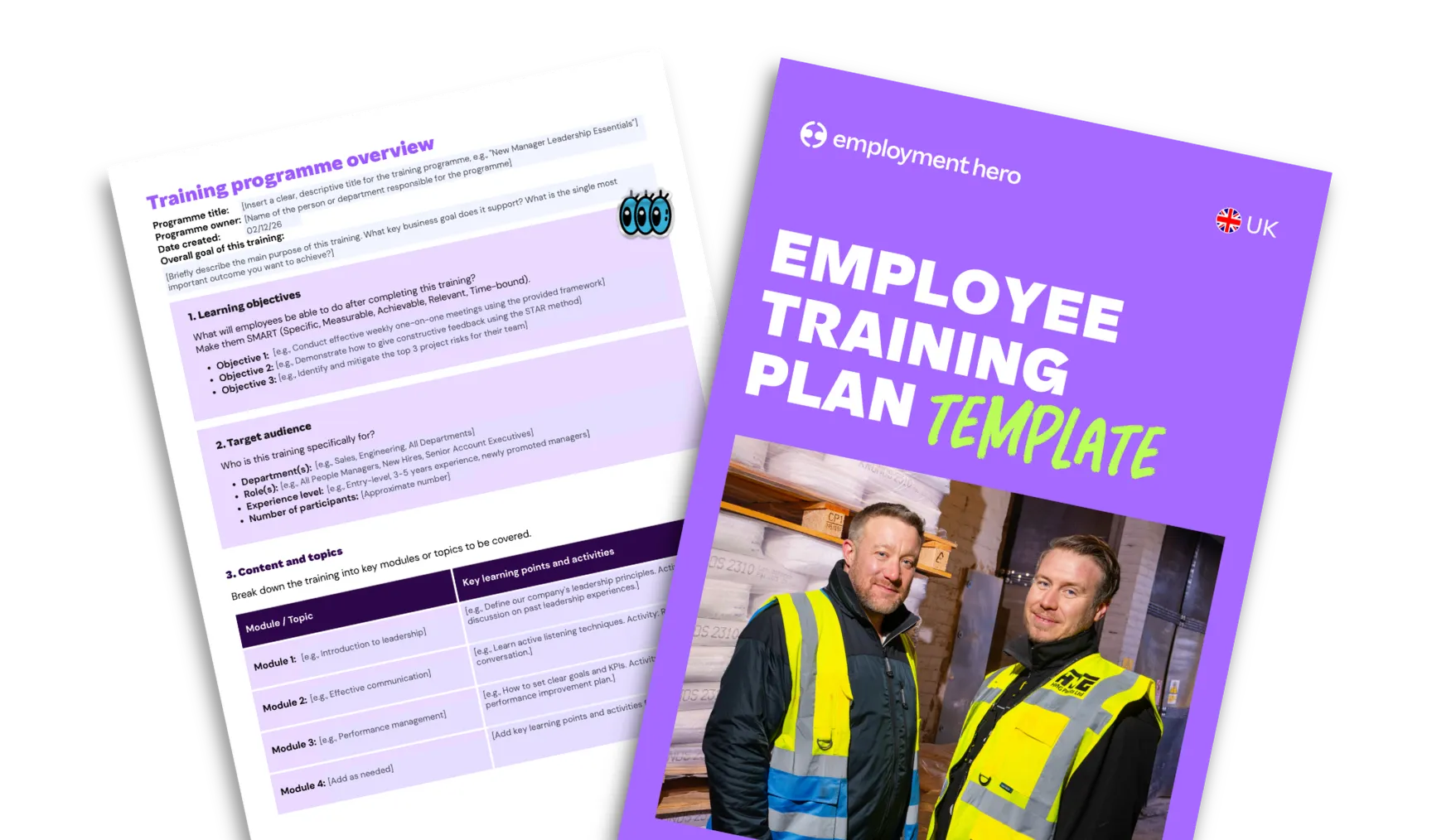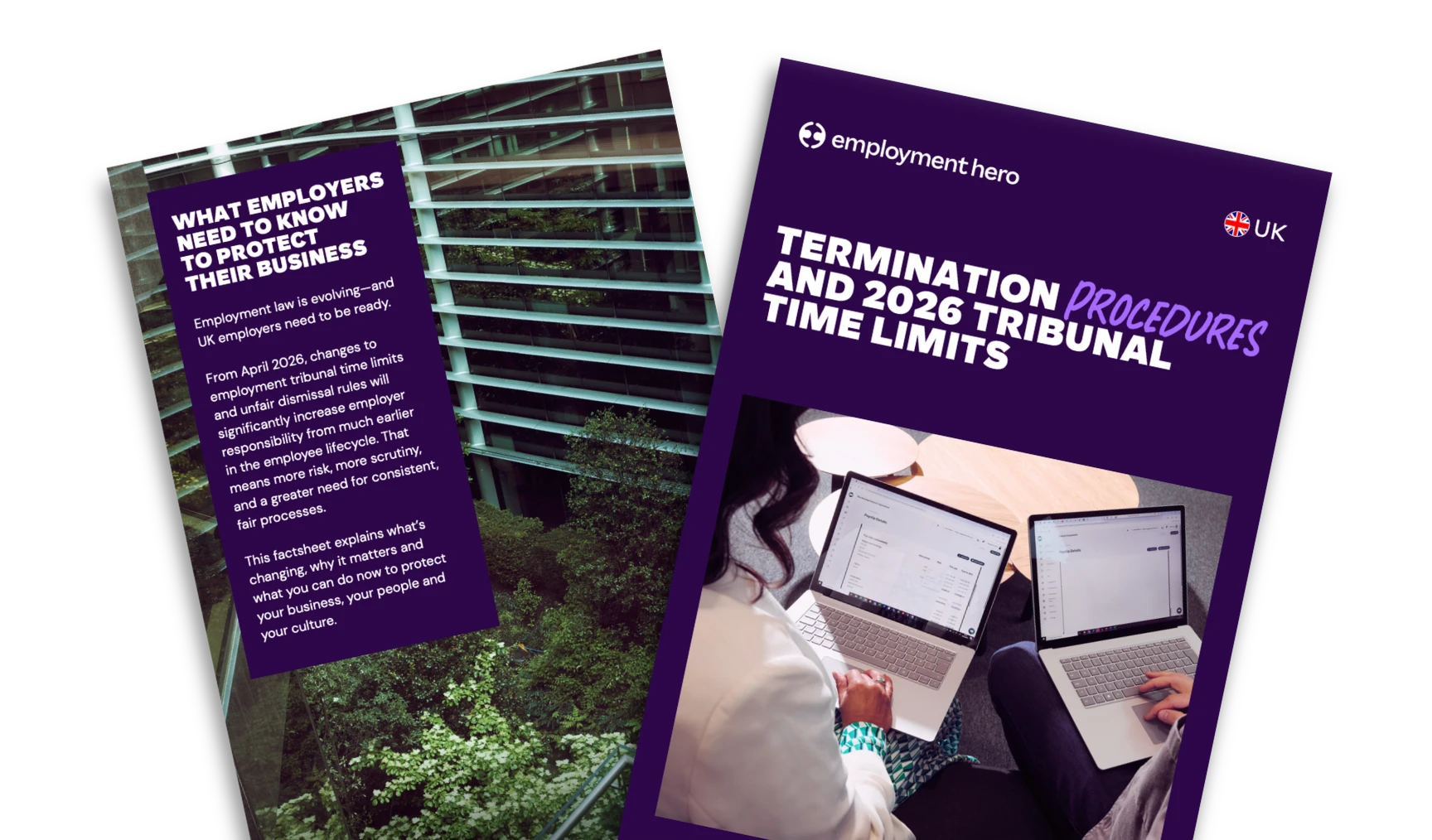Overpayment of Salary: What Happens If A Company Overpays An Employee?
Published
Overpayment of Salary: What Happens If A Company Overpays An Employee?
Published
Mistakes in payroll can easily happen, in fact according to Employment Hero’s research 84% of small-medium enterprises (SMEs) have experienced them and a huge 40% of SMEs have already incurred fines or penalties. And the reality is, it’s more likely to happen if you’re using manual processes or outdated payroll software.
One of the most common errors? Overpayment of salary. This is when an employee receives more pay than they’re entitled to. While it might sound like a lucky accident for the employee, it can create headaches for both parties if not addressed quickly and legally.
While more common than you might think, errors such as this are often swept under the rug, but the reality is, that isn’t solving the important problems. So we’ll break down everything you need to know about overpayment of salary.
What’s included in the guide?
- Step-by-step recovery process
- Recovery flowchart
- Best practice checklist for avoiding salary overpayments
What is an overpayment of salary?
An overpayment of salary occurs when an employee receives more money in their pay packet than they are contractually entitled to.
This could be due to:
- Payroll processing errors – miscalculations, double payments or entering incorrect hours/rates.
- Incorrect overtime – misapplied overtime multipliers or failure to reconcile time sheets.
- Data input mistakes – typos when inputting salary figures or bank details.
- System errors – outdated or misconfigured payroll software.
- Policy misunderstandings – e.g., misinterpreting allowances or entitlements.
When do salary overpayments usually occur?
Salary overpayments tend to happen at points where payroll processes are most complex or employee circumstances are changing. Some of the most common situations include:
- New starters – Errors can occur when setting up new employees in the payroll system. Common issues include entering an incorrect start date, paying the wrong salary or accidentally processing duplicate payments during onboarding.
- Leavers – Final payments often involve calculations for unused holiday entitlement, notice periods or deductions. Mistakes at this stage, such as paying for a full month instead of a partial one, are a frequent source of overpayment.
- Sick pay miscalculations – Balancing Statutory Sick Pay (SSP) with contractual sick pay can be tricky. Employers may inadvertently overpay if entitlements are not reduced correctly after statutory thresholds are met.
- Maternity, paternity, or shared parental leave – Pay adjustments during family leave are particularly complex, as they involve statutory pay rules alongside company policies. Misapplications of these rules can lead to an employee receiving more than their entitlement.
- Variable working hours – For employees on flexible or casual contracts, payroll teams must reconcile fluctuating hours each period. Miscalculations are more likely when hours differ week to week.
These scenarios highlight how salary overpayments often arise during transitions or exceptions to normal pay cycles. By recognising these high-risk situations, employers can put checks in place to reduce the likelihood of errors.
How to identify wage overpayment quickly
Spotting an overpayment of salary early makes recovery simpler and avoids unnecessary complications with employees and HMRC. Employers can use several strategies to identify errors before they escalate:
- Regular payroll audits – Routine checks of payroll reports against employee contracts, timesheets and HR records help uncover discrepancies such as incorrect rates, duplicated payments, or misapplied allowances.
- Payroll software alerts – Many modern payroll systems include built-in error detection features. These can flag anomalies such as sudden spikes in pay, duplicated entries, or inconsistencies with previous pay runs.
- Bank reconciliation checks – Comparing payroll outputs with bank transactions each pay cycle ensures payments match the approved payroll file. Even small mismatches can highlight potential overpayments.
- HMRC reconciliations – Employers must regularly reconcile PAYE and National Insurance contributions with HMRC records. Discrepancies between reported figures and actual payroll data can be an early indicator of errors.
- Encouraging employee feedback – Employees often notice when their take-home pay doesn’t align with expectations. Creating a culture where staff feel comfortable raising concerns helps catch overpayments quickly.
By combining system safeguards with manual checks, employers can reduce the risk of salary errors going unnoticed for multiple pay cycles. Early detection not only protects company finances but also helps maintain employee trust.
How to recover overpaid wages legally
When an overpayment of salary occurs, employers can reclaim the money, but recovery must be fair and compliant with employment law.
Step 1: Notify the employee – Inform them in writing, explaining the amount, the cause and the plan to recover it.
Step 2: Agree a repayment schedule – Large deductions can cause hardship, so discuss options and spread repayments if needed.
Step 3: Confirm in writing – Document the repayment terms and share copies with both parties.
Step 4: Update payroll records – Correct records immediately to ensure accurate tax, NIC and reporting.
Step 5: Act fairly – Many employees spend overpayments in good faith. Handle the process with professionalism to maintain trust.
Handled promptly and transparently, reclaiming an overpayment is usually straightforward.
Is there a salary recovery time limit?
One of the most common questions employers ask is whether there is a statutory deadline for reclaiming an overpayment of salary.
From a legal perspective, there is no fixed time limit on recovering salary overpayments. The Employment Rights Act 1996 allows employers to make deductions from wages to recover genuine overpayments, regardless of when the error occurred. In practice, however, timeframes do matter.
- Statutory considerations – While there’s no specific expiry date on overpayment recovery, general debt recovery rules apply. In the UK, employers normally have up to six years to bring a claim in the civil courts if recovery through payroll deductions isn’t possible (for example, if the employee has already left).
- Practical considerations – The longer an overpayment goes unnoticed, the harder it can be to recover. Employees may have spent the money in good faith and a sudden request for repayment years later could create financial strain or lead to disputes.
- Best practice – Address overpayments as soon as they are discovered. Acting quickly shows fairness, helps preserve trust and avoids complex adjustments to tax and National Insurance records.
Ultimately, while employers are legally entitled to reclaim overpayments, a timely, transparent approach is always more effective and less disruptive.
When can you reclaim an overpayment of salary?
An overpayment of salary is treated as a debt owed to the employer and recovery is allowed under employment law. However, it must be handled fairly to avoid disputes or claims of unlawful deduction.
Can an employer claim back overpayment of salary?
Yes. Under the Employment Rights Act 1996, employers can deduct genuine overpayments from wages without consent. Still, best practice is to agree to a repayment plan with the employee, as large unilateral deductions can cause hardship and harm trust.
Can salary overpayment be reclaimed in redundancy cases?
Yes. Employers may recover excess redundancy, notice, or holiday pay, but sensitivity is key. Clear communication, written confirmation and a fair repayment schedule help reduce disputes, especially during an already difficult time.
Can an employer recover overpayments from former employees?
Yes. Employers can request repayment directly, agree a plan, or pursue legal action if necessary. However, courts may limit recovery if the employee spent the money in good faith and repayment would cause serious hardship, a defence known as “change of position.”
What are the HMRC implications of correcting an overpayment?
Correcting an overpayment of salary affects not just payroll but also PAYE, National Insurance and HMRC reporting.
- Payroll records – Employers must amend records to reflect the correct salary and recalculate PAYE/NIC on the reduced figure. Importantly, deductions to recover the overpayment must not be taxed again.
- RTI reporting – Corrections must be reported to HMRC through Real Time Information, either by amending the Full Payment Submission (FPS) or, if needed, submitting an Employer Payment Summary (EPS). Prompt updates avoid mismatches with HMRC records.
- Year-end adjustments – If the error isn’t corrected until later in the tax year, the corrected figures must be shown on the employee’s P60 and the employer’s year-end submissions.
- Employee tax position – Overpayments can cause excess tax deductions. Once records are corrected, HMRC will update the employee’s tax account and issue any refunds due.
Failing to correct overpayments properly risks HMRC penalties and leaves employees with inaccurate tax records, potentially affecting loan or benefit applications.
How to prevent salary overpayments in future
While an overpayment of salary can be corrected, prevention is far better. Employers can reduce errors and protect both finances and employee trust by focusing on three key areas:
Strengthen payroll systems – Use reliable software, set up automated checks for anomalies and keep systems updated to meet legislation.
Invest in training – Ensure payroll teams understand statutory entitlements and company policies, cross-train HR and finance and run refresher sessions when rules change.
Implement strong processes – Require dual approval for payroll changes, schedule regular audits and maintain clear communication between HR, payroll and managers.
Review and improve – Analyse the cause of any errors and encourage employees to flag discrepancies quickly.
By combining strong systems, skilled staff and clear processes, businesses can greatly reduce the risk of costly payroll mistakes.
Download the guide
Salary overpayments can happen in any business, whether due to system errors, onboarding mistakes or complex statutory calculations. What matters most is how quickly and fairly they are identified, corrected and prevented in future. By putting the right processes, checks, and communication in place, employers can protect both their finances and employee trust.
To download the guide, we just need a few quick details.
Related Resources
-
 Read more: How to Create an Employee Training Plan: Template & Guide
Read more: How to Create an Employee Training Plan: Template & GuideHow to Create an Employee Training Plan: Template & Guide
Ready to build a training program that drives results? Learn how to create an effective employee training outline that aligns…
-
 Read more: Termination Procedures and Tribunal Time Limits: What the 2026 Rule Changes Mean for Employers
Read more: Termination Procedures and Tribunal Time Limits: What the 2026 Rule Changes Mean for EmployersTermination Procedures and Tribunal Time Limits: What the 2026 Rule Changes Mean for Employers
Learn how the 2026 changes to the employment tribunal time limit impact termination procedures. Protect your business with compliant processes…




















